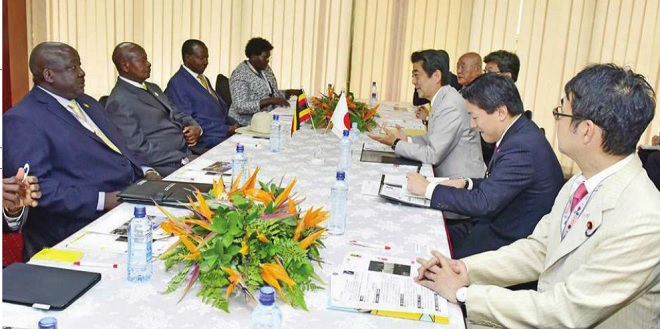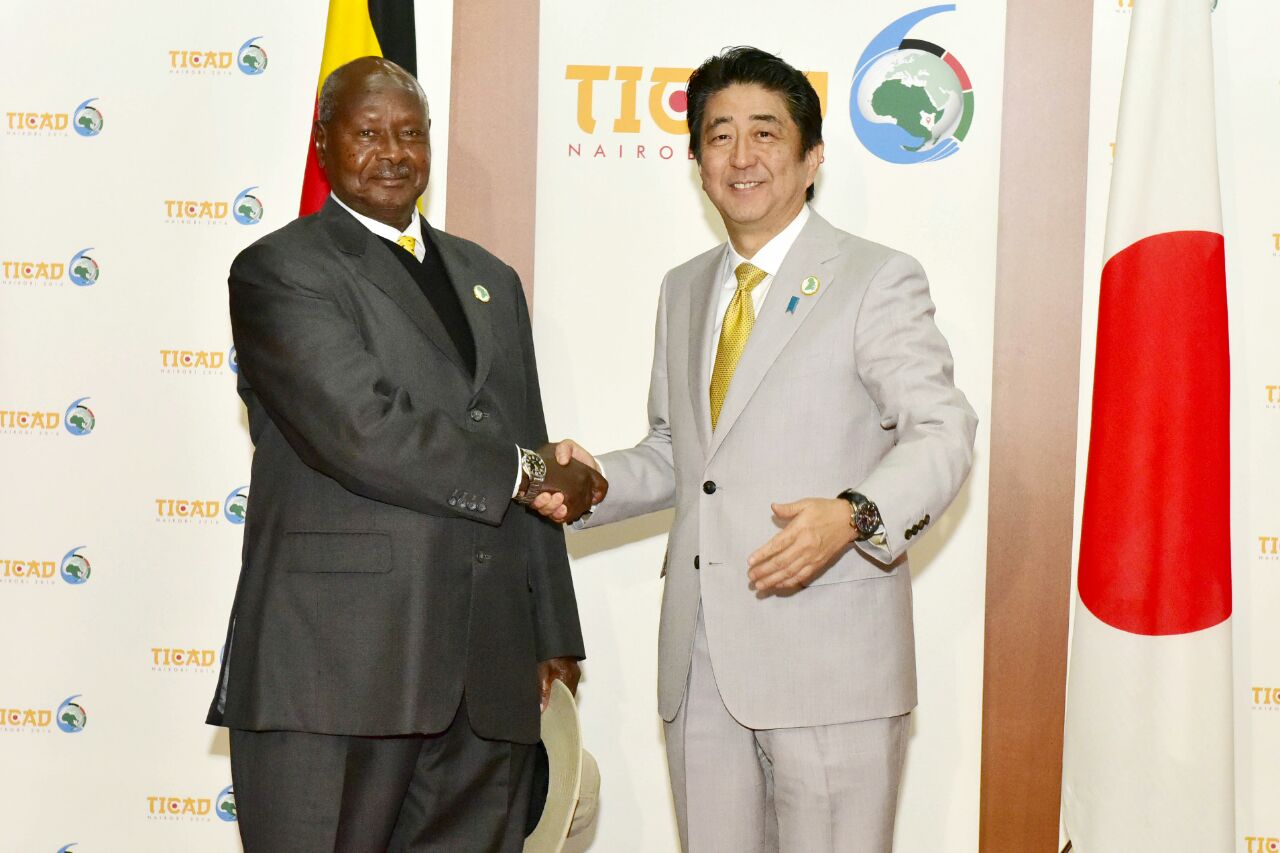
Toshiba, Uganda sign geothermal power agreement as Japan announces plan to spend $30b on African energy
When President Yoweri Museveni met a Japanese delegation led by Prime Minister Shinzo Abe in Nairobi August 28, he knew exactly what Uganda needed from Japan. At a brief meeting at the sixth Tokyo International Conference on African Development (TICAD), in Nairobi, Kenya, Museveni listed four key areas of cooperation that he said should be stressed between Uganda and Japan.
First on the list was opening the Japanese market to Ugandan products as a way of helping to create a balance of trade as Uganda “has bought more from Japan than it has from us.” Secondly, he cited infrastructure, and did commend Japan for the support it has rendered through the various projects being undertaken including the new bridge on the River Nile in Jinja. He also urged Japan to encourage its tourists to come to Uganda and fourthly to encourage Japanese companies to invest in Uganda.
Shortly afterwards, Toshiba Corporation, a Japanese electric company, concluded a memorandum of understanding (MoU) with the Ministry of Energy and Mineral Development on a comprehensive partnership in geothermal power that will see the parties collaborate in power generation projects, including personnel development. South – Western Uganda is heavily endowed with hot springs with a huge geothermal potential estimated at more than 500MW. Uganda currently depends on hydropower for its electricity needs.
Under the terms of the MoU, Toshiba will partner with Uganda on the development and supply of major equipment for a geothermal power plant, create operation and management guidelines, and cooperate in personnel development. A statement said Toshiba’s participation from the development stage positions the company to contribute to the early construction of the plant, and to supply geothermal power generation equipment in the future.

“The development of Uganda’s geothermal energy resources is in line with our energy policy objectives of increasing power generation capacity and diversifying our energy mix in order to achieve least cost, affordable and stable energy supply,” said Fred Kabagambe-Kaliisa, the energy ministry permanent secretary. “We are very confident that the government and Toshiba will create a strong Public-Private-Partnership to develop the geothermal energy resources.”
Toyoaki Fujita, the Toshiba business development executive, said, they hope to build a strong partnership with Uganda and to contribute to the development of sustainable power supply. The interior of the earth’s crust is extremely hot and the heat generated can be tapped by turbines to generate electricity.
Earlier, Prime Minister Abe had told the TICAD that Japan would mobilise a total of $30 billion in private- and public-sector funds to invest in Africa over three years to boost infrastructure-building in the resource-rich continent.
He also said that Japan would provide financial assistance for geothermal power projects in Africa, with Japanese trading houses and plant builders eyeing new business opportunities in this underdeveloped area of the continent’s infrastructure, has said.
Currently, most of Africa’s geothermal potential is concentrated in the east, in Kenya, Ethiopia and Uganda at Lake Katwe, Buranga, Kitagata, Ihimba and Kibiro with subsurface temperatures of above 200 degrees Centigrade. But less than 5% has actually been developed, owing to the high cost of drilling down to heat reservoirs and building the plants themselves. Test bores are said to be successful less than half the time. Toshiba recently delivered four geothermal turbines to Kenya that started commercial operation in 2015.
The Japanese government, Abe added, will provide both financing and know-how for African geothermal projects from the initial stage, hoping to improve the odds of success in exploration. Grants will cover a portion of pre-construction-stage costs, which can run to $100 million. For starters, the government will appropriate more than 1 billion yen ($9.97 million) for grant provision as part of a supplementary budget for the current fiscal year.
In addition, Japan wants to provide low-interest loans from the Japan International Cooperation Agency and other financing available for African geothermal projects that have reached the construction stage.
In Kenya’s Olkaria region about 100 Km northwest of Nairobi, Japanese players including Toshiba are eyeing the possibility of orders for additional capacity there in conjunction with a buildup expected to bring the total from nearly 600,000kW now to more than one million kilowatts.
Trading house Toyota Tsusho and Toshiba, which won a 2011 contract for geothermal power facilities in Olkaria, may provide additional capacity. Other pairs of contenders include Mitsubishi and Mitsubishi Hitachi Power, and Marubeni and Fuji Electric. Meanwhile, Toyota Tsusho and national utility Kenya Electricity Generating are planning feasibility studies for geothermal installations beyond that region.
President Museveni was grateful to Japan for the “good projects” that have been undertaken in Uganda. “I am pleased with progress in the construction of a bridge in Jinja, the roads in Kampala that include flyovers and hospitals,” he said.
Independent Reporter & Agencies
****
editor@independent.co.ug
 The Independent Uganda: You get the Truth we Pay the Price
The Independent Uganda: You get the Truth we Pay the Price





